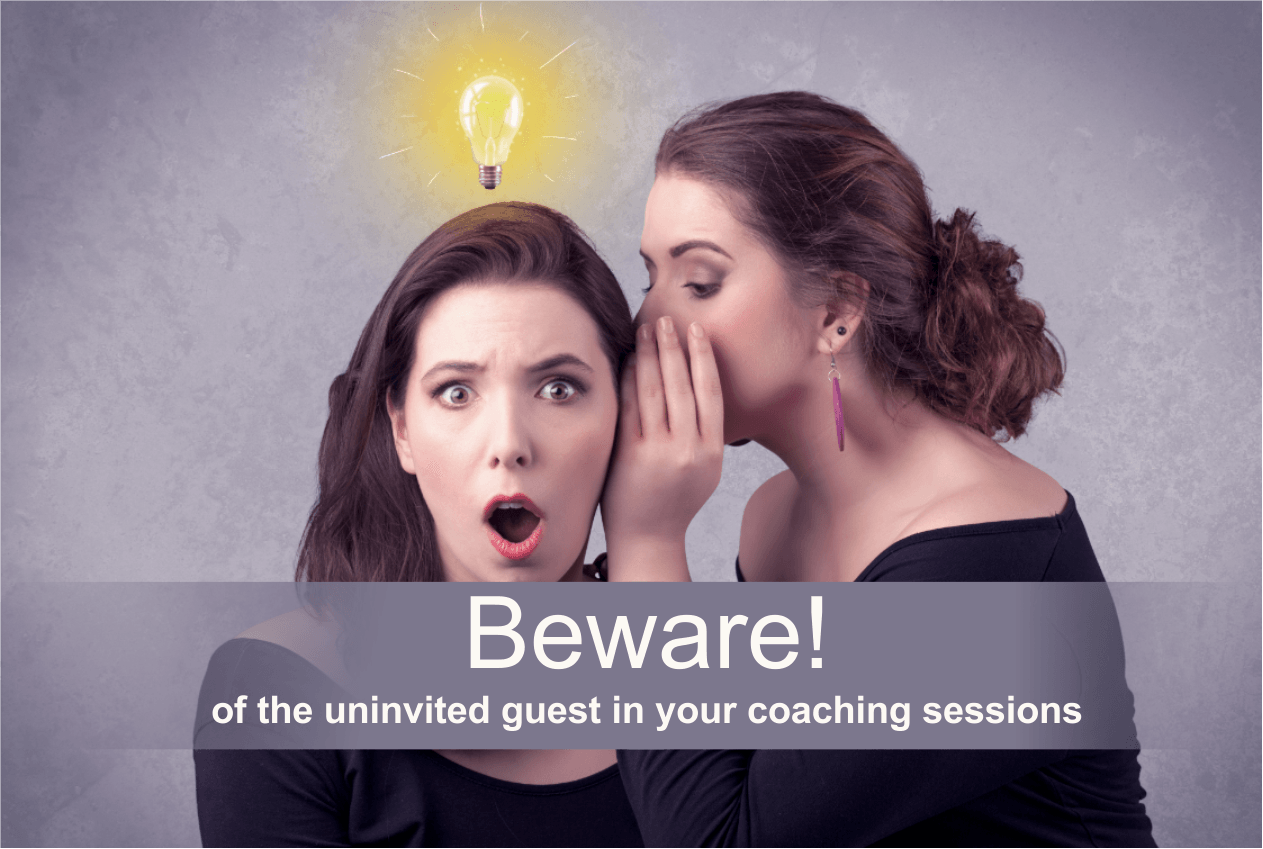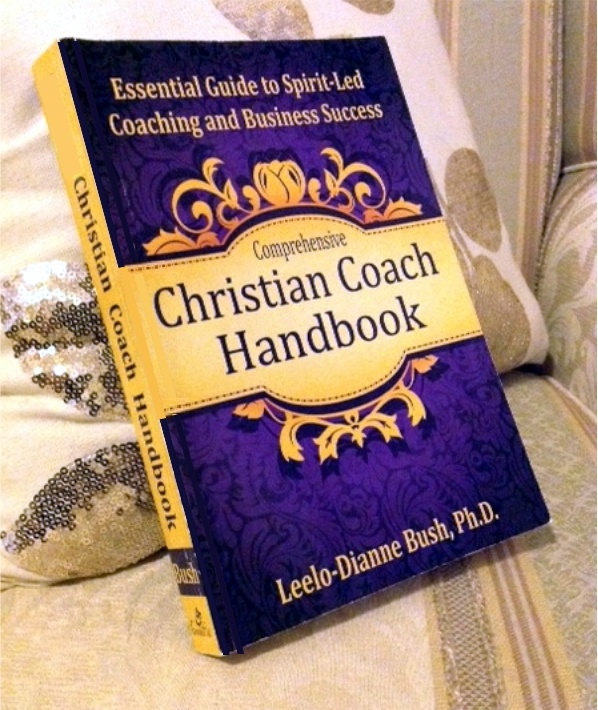Beware of the Uninvited Guest In Your Coaching Session
It’s not unusual to encounter an uninvited guest in your coaching session. I am talking about what secularly-trained coaches refer to as the "Gremlin" and I call UG. It's also known as mental chatter, "monkey mind", negative self talk or the voice that whispers deceptive ideas to your client as though they were true. It can derail your client or the coaching session if you aren't prepared.
Allow me to explain.
This is a topic that is imperative to cover with your client during their initial intake session to prepare your client. It is not unusual for the client to desire God's will, begin to take steps towards it and suddenly be confronted with self-doubt, fear and frustrations.
Maybe you, yourself have been there. I know I have. You feel like finally you are on the right track and suddenly it seems the rug gets pulled out from under you.
This is not the time to stop or quit. It means we need to press on with even greater determination because the enemy is trying to thwart God's plan and we can't let him!
There is no need to fear. Christ has already won the battle. We just need to walk it out.
Each one of us has positive thoughts and negative thoughts. The word of God says that from the overflow of what is in one's heart, their mouth speaks.
“… for of the abundance of the heart his mouth speaketh.” ~ Luke 6:45 (AKJV)
We are also predisposed to positive and negative default settings with what we tell ourselves or what I call self-messaging. Often this originates from words or thoughts that we have repeatedly mulled over in our mind or received from an external source until we actually begin to believe they are true and permanent.
“We humans, it seems, have anywhere from 12,000 to 60,000 thoughts per day. But according to some research, as many as 98 percent of them are exactly the same as we had the day before. Talk about creatures of habit! Even more significant, 80 percent of our thoughts are negative,” says Jennifer Read Hawthorne.
Is it any wonder then, that we could have difficulty focusing on the positive? For centuries man lived in a much harsher, more dangerous world and our minds had to be alert to peril lurking around any corner.
Now in our modern, safer world, we no longer need to worry about attacks from wild animals. Since this is no longer the case, our challenge now is to retrain our brain to become efficient in today’s world. And scientific advances in neuroscience, the study of our brain, will help us do so.

Dr. Caroline Leaf
"Every time you have a thought, it is actively changing your brain and your body - for better or for worse," says Dr. Caroline Leaf, an expert on the scientific and spiritual aspects of the human brain.
Neuroscience has proven that the more a thought is repeated in our brain, the stronger its connections become in the dendrites that store our memory. When thought patterns or sequences are repeated they become established in our brains and one thought will always trigger the sequential, specific thought.
If these are positive thoughts, it’s not a problem. But if it’s a negative or downward-spiraling thought pattern, then it can become very intrusive and even debilitating.
Without getting into exactly how the brain processes thoughts, it has now been scientifically proven we can literally build or "tear down thought strongholds by choosing to bring the thought into conscious awareness for analysis," says Dr. Leaf, "and changing it to repentance and forgiveness, then replacing it with the correct information using Philippians 4:8 or something similar as a guideline."
“Finally, brothers and sisters, whatever is true, whatever is noble, whatever is right, whatever is pure, whatever is lovely, whatever is admirable—if anything is excellent or praiseworthy—think about such things.” ~ Philippians 4:8
Meanwhile, until our client is able to acknowledge, identify and destroy those specific, negative strongholds, a coach is left to deal with coaching around the UG or the Unwelcome Guest.
Secularly-trained coaches are taught that the Gremlin will always be there and you will never be able to get rid of it. How sad! We know as Christians, that by the grace of God we can reduce and/or completely eliminate these negative effects. Aren’t you glad you opted for Christian coaching?
I encourage you to read Dr. Leaf's book, "Who Switched Off My Brain?" to learn how to control toxic thoughts and emotions.
Below I will share some characteristics of UG and I think you will discover, as I did, that they are remarkably similar to characteristics of how Satan operates. Of course secular coaches do not call it that because to do so would require taking a stand on the existence of the enemy of our soul.
In order to remain less confrontational in coaching sessions, we can refer to this phenomenon as an UG. In coaching sessions, we need to acknowledge the source while keeping our focus on the client and their needs instead of rabbit trailing into theological discussions. That is a conversation better suited for another time and venue.
You can identify an UG by the following:
- It's the doubting voice that tells you that you aren't doing things well enough.
- It's the voice of unreasonable fear. UG is nearly always in fear of something.
- It could be the distracting voice that says you should be doing something different.
- It's the negative message that you are not enough, your ability is insufficient so what’s the use of trying?
- Or the voice that says a task is stupid, too risky or impossible to achieve.
- It's the voice that tells you that you lack the talent, the age or youth or experience needed.
- This voice will point out your weaknesses, fears, failures and self-limitations.
- It's the voice you hear that holds you back and keeps you down or disempowers you.
- It may accuse and condemn you anytime you fall short or make a mistake.
Do any of those characteristics sound familiar?
So here is the good news and the bad news. The good news is that you will know that you are on the right track if you hear UG. The bad news is that UG is not going away soon. But the more your client acts despite the UG voice, the less he will eventually hear it.
During your initial intake session, you and your client must talk about UG and potential for self-sabotaging behavior. That way, everyone will be prepared in advance of a UG event and for how it will be handled.
Usually your first UG event will turn up somewhere between sessions 3 and 6, once the enthusiasm for working on a goal with a coach has waned a bit. Another reason we recommend a coaching agreement of at least 3 months is to give the coach and client time to work through UG events successfully.
It is not unusual for UG to show up in your coaching session at some point. You may recognize UG before your client does. Here's how it often shows up… The client is about to embark on new action and he or she'll say something like, "I'm not ready yet," or "I need to think about this some more," or "I can’t do that."
Here's how you can handle an UG:
Say to your client, "Sounds like I am hearing UG, our uninvited guest. Ok UG, no one invited you. Time to leave. Bye!
However, if your client is otherwise spiritually in tune, there's nothing wrong with saying, "Satan get thee behind (client's name) in Jesus name. That is a lie from the enemy." My view is that it is better to call out the source of the deception if you are working with a client who is ready to hear it in those terms. But not everyone is.
I strongly encourage you to pray for discernment in the beginning of and throughout your coaching session so that you can deliver the precise message that your client needs in the given moment.
Remember, the duty is yours but the results belong to God.
Now I want to hear from you.
Have you ever had experience with an UG in a coaching session? How was it handled? What did you learn in the process?
Need to get certified as a coach or counselor?

Thousands of students will confirm that you are in the perfect place to get the training you need to help your clients as well as learn how to reach those who God has led you to help.
Many of our courses offer dual certifications. You will find the courses currently available listed at https://pccca.org/courses/ Yes, when you take one course, you receive two certifications. This way you have a credential that will be recognized wherever you have an opportunity to work, whether it is a business or church/ministry type of setting.
New this year: Now we also have course bundles to help you save on tuition. These are courses that are typically purchased together. You can find them at: https://pccca.org/course-bundles/
Just click the button above to select your course, enroll and begin today. Why not get certified before the end of the year so you can begin your practice in January?
PS You may be wondering why many of our students pay for their courses in full. The reason is that when you do, you can request FULL access to your course so you can do it at your own pace, as quickly as you like. Otherwise you may have to wait a week to a month for your next module, depending on the course. Most students are excited to get prepared to serve their clients.




